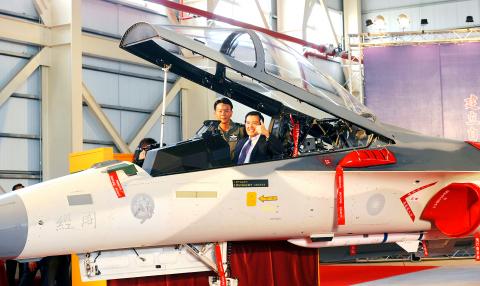With efforts to acquire F-16C/D aircraft from the US in limbo, the air force was yesterday given a shot in the arm when it received the first six of a planned 71 upgraded multi-role Indigenous Defence Fighters (IDF).
The F-CK-1A/B MLU (“mid-life upgrade”) was unveiled during a handover ceremony at the Aerospace Industrial Development Corp (AIDC, 漢翔航空) plant in Shalu (沙鹿), Greater Taichung, attended by top brass and scores of politicians, including President Ma Ying-jeou (馬英九), Deputy Minister of National Defense Chao Shih-chang (趙世璋) and Taichung Mayor Jason Hu (胡志強).
Years in the making, the upgrade involves a revamping of the aircraft’s avionics and flight control systems, a triple-color heads-up display and anti-electronic jamming functions, as well as the full integration of air-to-ground and air-to-air missiles developed by the Chungshan Institute of Science and Technology (中山科學研究院), such as the Tien Chien II “Sky Sword.”

Photo: Sam Yeh, AFP
It is reported that the aircraft will also be fit to carry the Tien Chien IIA anti-radiation missile, which remains under development. The aircraft can now carry four air-to-air missiles, from two on the original model.
Although it had been previously reported that the upgraded aircraft would have a greater operational range, the range is unchanged, and the twin Honeywell F125-70 afterburning turbofan engines are the same as on the original model.
The first six revamped aircraft, which are part of a US$588 million first phase of upgrades, are to join the 443 Tactical Fighter Wing in Greater Tainan.
Shiah Kang (夏康), senior vice president at state-owned AIDC, told the Taipei Times that between 28 and 30 F-CK-1A/B MLUs were scheduled for delivery this year, with the remainder due by the end of next year.
Shiah said that depending on the budget, the remainder of the IDFs in the air force, or 56 aircraft, could be upgraded as part of an MLU-2 program.
Under phase two of the project, AIDC would provide the air force with a range of options to meet a variety of tactical requirements, he said.
Addressing the ceremony, Ma said that when the IDF, a domestic program, was being developed in the 1980s after the US refused to sell Taiwan F-20s and F-16s, skeptics would jest that IDF stood for “I don’t fly.”
Over the years, the meaning of the acronym has changed and I hope it can now stand for “I do fight” and “I don’t fail,” Ma said.
The initial IDFs were introduced to the air force in 1994, with the first revamping program launched in 2000.
While the upgrade points to advances in Taiwanese avionics and capabilities, defense experts and Lockheed, maker of the F-16, say the new IDF is insufficient to ensure parity with an increasingly modern People’s Liberation Army Air Force.
In addition to the IDF program, a US$4.5 billion plan to upgrade Taiwan’s fleet of 144 F-16A/Bs is expected to commence later this year or next year.

CHAOS: Iranians took to the streets playing celebratory music after reports of Khamenei’s death on Saturday, while mourners also gathered in Tehran yesterday Iranian Supreme Leader Ayatollah Ali Khamenei was killed in a major attack on Iran launched by Israel and the US, throwing the future of the Islamic republic into doubt and raising the risk of regional instability. Iranian state television and the state-run IRNA news agency announced the 86-year-old’s death early yesterday. US President Donald Trump said it gave Iranians their “greatest chance” to “take back” their country. The announcements came after a joint US and Israeli aerial bombardment that targeted Iranian military and governmental sites. Trump said the “heavy and pinpoint bombing” would continue through the week or as long

TRUST: The KMT said it respected the US’ timing and considerations, and hoped it would continue to honor its commitments to helping Taiwan bolster its defenses and deterrence US President Donald Trump is delaying a multibillion-dollar arms sale to Taiwan to ensure his visit to Beijing is successful, a New York Times report said. The weapons sales package has stalled in the US Department of State, the report said, citing US officials it did not identify. The White House has told agencies not to push forward ahead of Trump’s meeting with Chinese President Xi Jinping (習近平), it said. The two last month held a phone call to discuss trade and geopolitical flashpoints ahead of the summit. Xi raised the Taiwan issue and urged the US to handle arms sales to

BIG SPENDERS: Foreign investors bought the most Taiwan equities since 2005, signaling confidence that an AI boom would continue to benefit chipmakers Taiwan Semiconductor Manufacturing Co’s (TSMC, 台積電) market capitalization swelled to US$2 trillion for the first time following a 4.25 percent rally in its American depositary receipts (ADR) overnight, putting the world’s biggest contract chipmaker sixth on the list of the world’s biggest companies by market capitalization, just behind Amazon.com Inc. The site CompaniesMarketcap.com ranked TSMC ahead of Saudi Aramco and Meta Platforms Inc. The Taiwanese company’s ADRs on Tuesday surged to US$385.75 on the New York Stock Exchange, as strong demand for artificial intelligence (AI) applications led to chip supply constraints and boost revenue growth to record-breaking levels. Each TSMC ADR represents

State-run CPC Corp, Taiwan (CPC, 台灣中油) yesterday said that it had confirmed on Saturday night with its liquefied natural gas (LNG) and crude oil suppliers that shipments are proceeding as scheduled and that domestic supplies remain unaffected. The CPC yesterday announced the gasoline and diesel prices will rise by NT$0.2 and NT$0.4 per liter, respectively, starting Monday, citing Middle East tensions and blizzards in the eastern United States. CPC also iterated it has been reducing the proportion of crude oil imports from the Middle East and diversifying its supply sources in the past few years in response to geopolitical risks, expanding